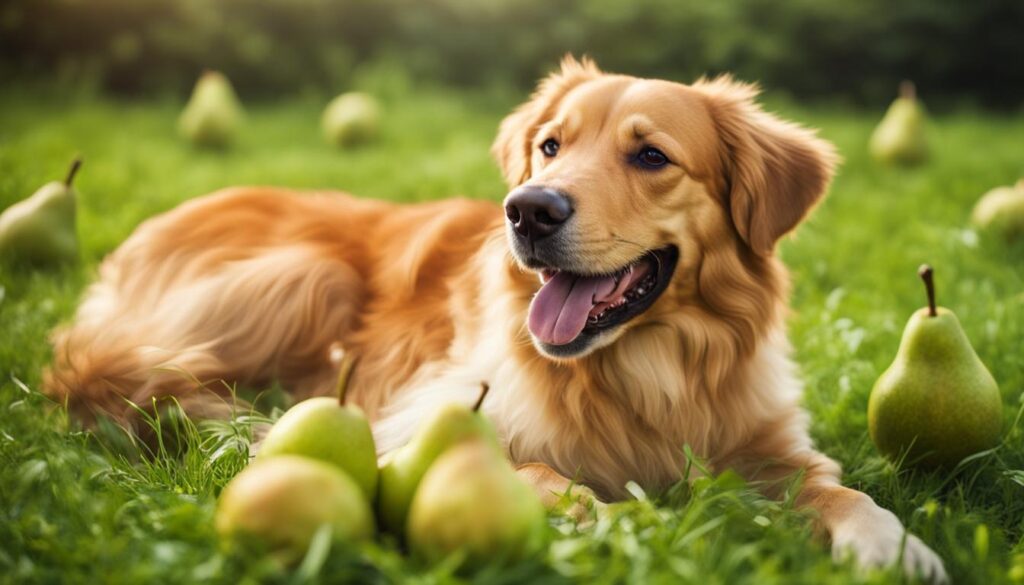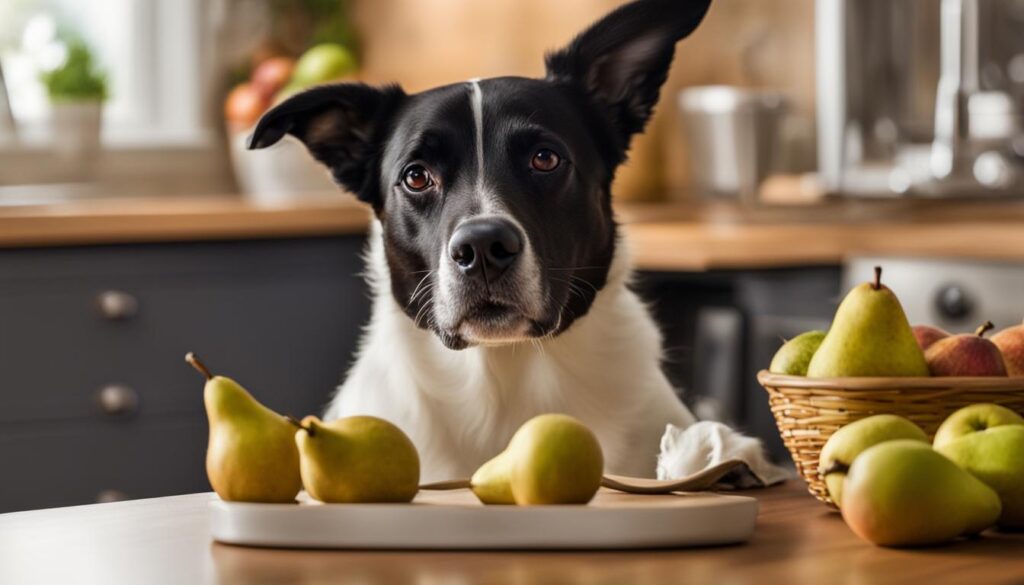Welcome, dog owners! If you’ve ever wondered whether your furry friend can enjoy the sweet taste of pears, you’re in the right place. In this article, we’ll explore whether dogs can safely eat pears, how to feed them in a way that won’t upset their stomachs, and the potential risks involved. So, before you share a juicy pear slice with your canine companion, let’s dig into the details!
Key Takeaways:
- Pears can be a safe and healthy snack for dogs when fed in moderation.
- It’s important to cut pears into bite-sized pieces to prevent choking and remove the stem, leaves, core, and seeds.
- Avoid feeding dogs canned pears due to their high sugar content.
- Pear seeds contain traces of cyanide, so always keep them away from your fur babies.
- Consult with your veterinarian before introducing any new foods to your dog’s diet.
Are Pears Good for Dogs?
When it comes to the benefits of pears for dogs, there are several reasons why they can be a healthy addition to their diet. Pears are packed with fiber, antioxidants, vitamins, and minerals, making them a nutritious snack for your furry friend. The fiber in pears can aid in digestion and promote bowel regularity, while antioxidants help support a strong immune system.
If you’re looking to incorporate pears into your dog’s diet beyond just feeding them as a standalone snack, you have options. Many dog owners choose to make homemade pear dog treats. These treats can be a fun and tasty way to give your dog the nutritional benefits of pears in a different form. Just make sure to use dog-friendly ingredients and avoid any added sugars or harmful additives. You can find recipes online or get creative and make your own!
Additionally, some commercial dog food brands include pears as an ingredient in their recipes. This allows your dog to enjoy the benefits of pears while also ensuring they receive a complete and balanced diet. If you choose to go this route, be sure to read the ingredient list carefully and look for high-quality dog food brands that prioritize real, wholesome ingredients.
Benefits of Pears for Dogs:
- A good source of fiber, promoting healthy digestion
- Packed with antioxidants to support a strong immune system
- Contain vitamins and minerals for overall health
“Pears are a nutritious snack for dogs, offering fiber, antioxidants, vitamins, and minerals. Homemade pear dog treats are a popular way for dog owners to incorporate this fruit into their dog’s diet. Commercial dog food with pears can also provide the benefits of this fruit in a balanced and convenient way.”
Remember, while pears can be beneficial for dogs, moderation is key. Too much of any food, including pears, can lead to an upset stomach or weight gain. Always consult with your veterinarian before making any significant changes to your dog’s diet, including introducing new foods like pears.

Risks of Feeding Pears to Dogs
While pears are generally safe for dogs, it’s essential to understand the potential risks associated with feeding them to your furry friend. Here are some key factors to consider:
Pear Digestion in Dogs
Feeding large quantities of pears to dogs can lead to gastrointestinal upset, including vomiting and diarrhea. This is because pears contain natural sugars and high fiber content that can be challenging for some dogs to digest. It’s recommended to introduce pears to your dog’s diet gradually and in small amounts to minimize the risk of digestive issues.
Toxicity of Pear Seeds
One important precaution to keep in mind is the toxicity of pear seeds. The seeds contain traces of cyanide, which can be harmful to dogs if ingested in large amounts. To prevent any potential poisoning, always remove the seeds before feeding pears to your furry buddy. Additionally, be cautious if your dog has accidentally consumed pear seeds, as it’s advisable to contact your veterinarian for guidance.
Pear Skin and Choking Hazards
While dogs can safely eat the skin of a pear if it has been thoroughly washed, it’s important to note that the skin can pose a choking hazard, especially for smaller dogs or those prone to swallowing food without chewing properly. To reduce this risk, cut the pear into bite-sized pieces and ensure that your dog is comfortably able to chew and swallow the fruit.
| Risks | Precautions |
|---|---|
| Potential gastrointestinal upset | Introduce pears gradually and in small amounts |
| Toxicity of pear seeds | Remove seeds before feeding pears to your dog |
| Pear skin choking hazards | Cut pears into bite-sized pieces for safe consumption |
By being aware of these risks and taking the appropriate precautions, you can safely incorporate pears into your dog’s diet and provide them with a nutritious and enjoyable snack.
Can Dogs Eat Canned Pears?
When it comes to feeding pears to your furry friend, fresh and ripe pears are always the best choice. However, you may be wondering if dogs can eat canned pears as an alternative. While canned pears may seem convenient, they are not recommended for dogs due to their high sugar content. Canned pears are typically preserved in heavy syrup, which can be detrimental to your dog’s digestion and potentially lead to obesity.
It’s important to prioritize your dog’s health and provide them with the best possible nutrition. Fresh pears are not only a healthier option but also offer a more natural and enjoyable eating experience for your dog. By opting for fresh pears, you can ensure that your furry friend is getting the nutritional benefits without the drawbacks of excessive sugar from canned varieties.
“Feeding canned pears to dogs can irritate their digestive tract and potentially lead to obesity.”
If you’re looking to introduce pears into your dog’s diet, it’s always recommended to consult with your veterinarian first. They can provide guidance specific to your dog’s health needs and advise you on the appropriate portion sizes and frequency of feeding pears. Remember to always remove the stems, leaves, core, and seeds before offering pears to your dog.

The Impact of Pears on Dog Digestion
Pears are generally gentle on a dog’s digestive system when fed in moderation. However, canned pears can disrupt the delicate balance of your dog’s digestive tract due to the high sugar content. Dogs have different digestive capabilities than humans, and their bodies are not designed to handle excess sugar.
Furthermore, the heavy syrup in canned pears can cause gastrointestinal upset, leading to issues such as diarrhea and vomiting. It’s important to prioritize your dog’s well-being and choose fresh pears instead, as they provide the same nutritional benefits without the added risks associated with canned options.
| Benefits of Fresh Pears for Dogs | Risks of Canned Pears for Dogs |
|---|---|
|
|
As a responsible dog owner, it’s important to prioritize your pet’s health by offering them fresh and wholesome foods. While canned pears may seem like a convenient option, they are not the best choice for your furry friend. Stick to fresh pears for a nutritious and enjoyable treat that won’t compromise your dog’s well-being.
How to Feed Your Dog Pears Safely
If you’re considering feeding your dog pears, it’s important to do so in a safe and responsible manner. Here are some tips to ensure your furry friend enjoys this tasty fruit without any issues.
Avoid Choking Hazards
Before offering pears to your dog, make sure to remove any potential choking hazards. Cut the pear into bite-sized pieces, ensuring they are small enough for your dog to comfortably eat. By doing so, you can prevent any accidental choking incidents.
Beware of Toxicity
While pears themselves are safe for dogs, it’s essential to remove any toxic parts. This includes the stem, leaves, core, and seeds. Pear seeds contain traces of cyanide and can be harmful if ingested in large amounts. So, always remember to thoroughly remove them before feeding pears to your dog.
Fun and Safe Feeding Ideas
Incorporating pears into your dog’s diet can be a fun and delicious experience. You can use pears as a food topper for their regular meals or even make homemade pear dog treats. Additionally, you can try stewing pears for dogs, which can be a tasty and nutritious treat for them.

The Bottom Line
Pears can be a healthy addition to your dog’s diet when fed in moderation and prepared properly. By following these tips, you can ensure your dog enjoys pears safely and without any digestive issues. Remember to consult with your veterinarian before introducing any new foods to your dog’s diet.
Conclusion
So, can dogs eat pears? Absolutely! Pears can be a safe and healthy addition to your four-legged friend’s diet. They provide essential vitamins and fiber, making them a nutritious snack option. Just remember to follow a few guidelines to ensure your pup enjoys pears the right way.
Firstly, always feed pears to your dog in moderation. While they offer nutritional benefits, too many can upset your dog’s tummy. Stick to the general rule of limiting treats to 10% of your dog’s daily food intake.
When offering pears, make sure to cut them into bite-sized pieces to prevent any choking hazards. Remove the stems, leaves, core, and most importantly, the seeds. Pear seeds contain traces of cyanide, which can be harmful to dogs in large amounts.
While fresh pears are the best choice, be cautious when it comes to canned pears. They often contain high levels of sugar, which can be detrimental to your dog’s digestion and overall health. Stick to fresh, ripe pears for optimal nourishment.
Remember, always consult with your veterinarian before introducing any new foods to your dog’s diet, including pears. They can provide personalized advice and ensure that your furry friend stays happy and healthy. So go ahead and offer your pooch a pearlicious treat – just make sure it’s in moderation and prepared safely!
FAQ
Can dogs eat pears?
Yes, pears can be a safe and healthy snack for dogs.
Are pears good for dogs?
Pears offer several nutritional benefits for dogs, including fiber, antioxidants, vitamins, and minerals.
What are the risks of feeding pears to dogs?
Feeding large quantities of pears can lead to gastrointestinal upset. It’s important to remove stems, leaves, core, and seeds, as the seeds contain traces of cyanide and can be toxic.
Can dogs eat canned pears?
It’s not recommended to feed dogs canned pears due to their high sugar content and potential for digestive issues.
How should I feed pears to my dog safely?
Cut the pear into bite-sized pieces, remove any potential choking hazards, and avoid giving your dog the stem, leaves, core, and seeds. Always consult with a veterinarian before introducing new foods to your dog’s diet.
Can I use pears to make homemade dog treats?
Yes, some dog owners use pears to make homemade dog treats or look for commercial dog food that includes pears as an ingredient.





